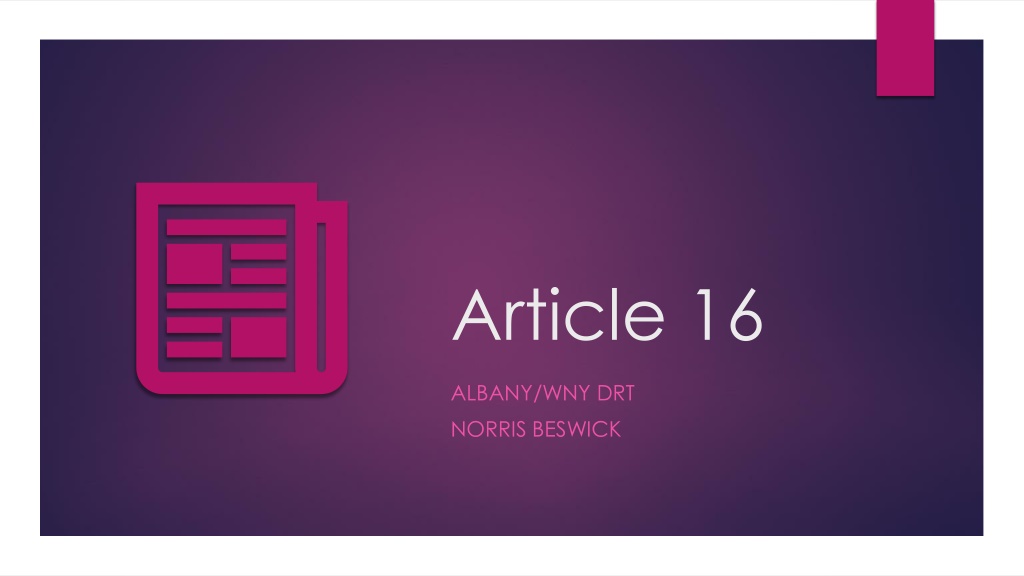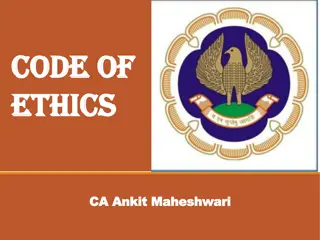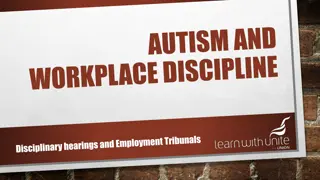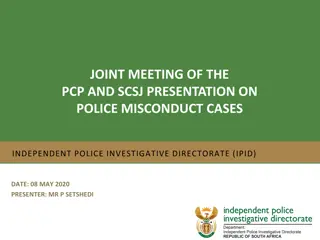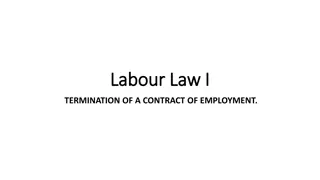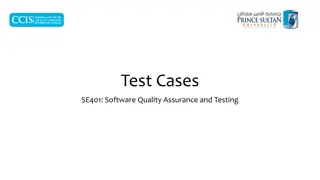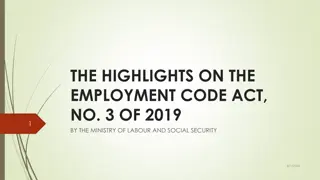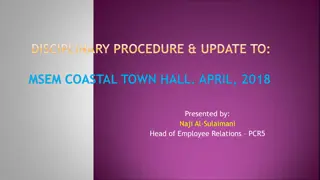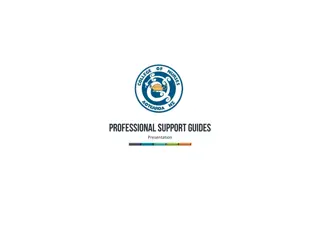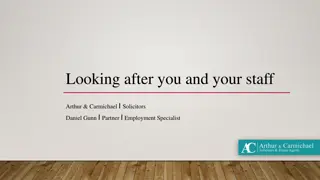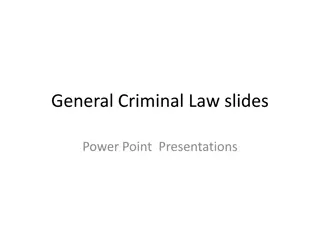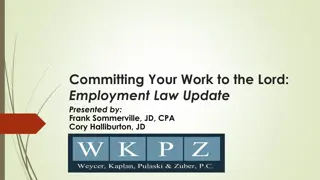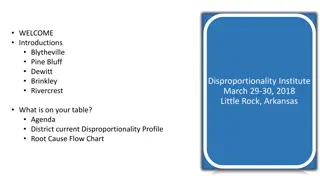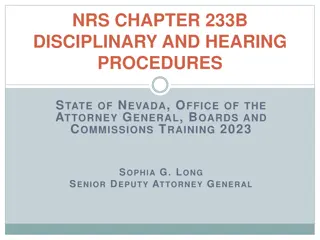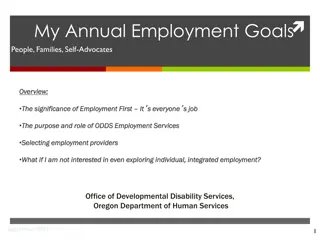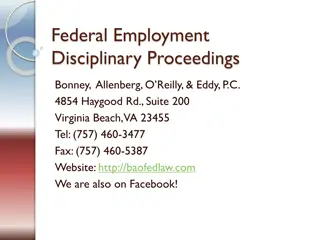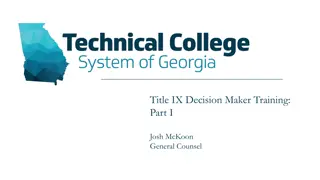Understanding Disciplinary Cases in Employment Law
Exploring the burden of proof in discipline vs. contract cases, the Just Cause Principle, and factors to consider in disciplinary actions. The importance of reasonable rules, consistent enforcement, and thorough investigations in managing employee discipline effectively.
Download Presentation

Please find below an Image/Link to download the presentation.
The content on the website is provided AS IS for your information and personal use only. It may not be sold, licensed, or shared on other websites without obtaining consent from the author. Download presentation by click this link. If you encounter any issues during the download, it is possible that the publisher has removed the file from their server.
E N D
Presentation Transcript
Article 16 ALBANY/WNY DRT NORRIS BESWICK
DISCIPLINE CASE vs. CONTRACT CASE Who has the burden of proof?
Just Cause Principle The principle that any discipline must be for just cause establishes a standard that must apply to any discipline or discharge of an employee.
Remember Remember #7 #7 It also has It also has to be to be Corrective Corrective and not and not Punitive Punitive Just cause is a term of art created by labor arbitrators. It has no precise definition. It contains no rigid rules that apply in the same way in each case of discipline or discharge.
Is the rule a reasonable rule? Is the rule consistently and equitably enforced? Is there a rule? Was the severity of the discipline reasonably related to the infraction itself and in line with that usually administered, as well as to the seriousness of the employee s past record? Was a thorough investigation completed? Was the disciplinary action taken in a timely manner?
Is there a rule? If so, was the employee aware of the rule? Was the employee forewarned of the disciplinary consequences for failure to follow the rule?
Management must make sure rules are reasonable, based on the overall objective of safe and efficient work performance. Is the rule a reasonable rule?
Is the rule consistently and equitably enforced? A rule must be applied fairly and without discrimination. Consistent and equitable enforcement is a critical factor. Consistently overlooking employee infractions and then disciplining without warning is improper.
Before administering the discipline, management must make an investigation to determine whether the employee committed the offense. Management must ensure that its investigation is thorough and objective. Was a thorough investigation completed?
Was the severity of the discipline reasonably related to the infraction itself and in line with that usually administered, as well as to the seriousness of the employee s past record?
Was the disciplinary action taken in a timely manner? DISCIPLINARY ACTIONS SHOULD BE TAKEN AS PROMPTLY AS POSSIBLE AFTER THE OFFENSE HAS BEEN COMMITTED.
Corrective Rather than Punitive The requirement that discipline be corrective rather than punitive is an essential element of the just cause principle. The basis of this principle of corrective or progressive discipline is that it is issued for the purpose of correcting or improving employee behavior and not as punishment or retribution.
CCAs CCAs may be disciplined or removed within the term of their appointment for just cause and any such discipline or removal will be subject to the grievance arbitration procedure, provided that within the immediately preceding six months, the employee has completed ninety (90) work days, or has been employed for 120 calendar days (whichever comes first) of their initial appointment. Further, while in any such grievance the concept of progressive discipline will not apply, discipline should be corrective in nature, rather than punitive.
Discipline issued to a CCA may not be considered or cited in determining whether to issue discipline to the CCA employee after his or her conversion to career status. This Photo by Unknown Author is licensed under CC BY-SA
For minor offenses by an employee, management has a responsibility to discuss such matters with the employee. A discussion is non-disciplinary and thus is not grievable. Discussions are conducted in private between a supervisor and an employee. JCAM 16.2 Section 2. Discussion Both the supervisor and the employee may keep a record of the discussion for personal use, however these are not to be considered official Postal Service records. They may not be included in the employee s personnel folder, nor may they be passed to another supervisor. Discussions cannot be cited as elements of an employee s past record in any future disciplinary action. Discussions may be used (when relevant and timely) only to establish, that an employee has been made aware of some particular obligation or responsibility.
Not A Discussion if: Other Attendance Review Return to Work Steward Present Carriers can Overhear
JCAM 16.3 Letter of Warning A letter of warning is a disciplinary notice in writing, identified as an official disciplinary letter of warning, which shall include an explanation of a deficiency or misconduct to be corrected.
JCAM 16.3 Letter of Warning Arbitrator Fasser held in NB-E5724, February 23, 1977 (C-02968), that a letter of warning which fails to advise the recipient of grievance appeal rights is procedurally deficient.
Suspensions issued under the provisions of Article 16.4 must advise the recipient of grievance appeal rights. JCAM 16.4 Suspensions of 14 Days or In no case may a supervisor impose suspension or discharge upon an employee unless the proposed disciplinary action by the supervisor has first been reviewed and concurred in by the installation head or designee. Less
JCAM 16.5 Suspensions of More Than 14 Days or Discharge Letter carriers must be given thirty days advance written notice prior to serving a suspension of more than fourteen days or discharge. During the notice period they must remain either on the job or on the clock at the option of the Postal Service. The only exceptions are for crime or emergency situations as provided for in Article 16.6 and 16.7.
Removal actions, subject to the thirty (30) day notification period in Article 16.5 of the National Agreement, will be deferred until after the Step B decision has been rendered, or fourteen (14) days after the appeal is received at Step B, whichever comes first Removal
This is true even if it results in the employee remaining on the job or on the clock for longer than the thirty days provided for in Article 16.5.
16.6 Indefinite SuspensionsCrime Situation The full thirty-day notice is not required in such cases. Just cause of an indefinite suspension is grievable. An arbitrator has the authority to reinstate and make whole. If the Postal Service returns an employee who was on an indefinite suspension to duty, the employee is automatically entitled to back pay for all but the first seventy days of pay.
JCAM 16.7 Emergency Procedure An employee may be immediately placed on an off-duty status (without pay) by the Employer, but remain on the rolls where the allegation involves intoxication (use of drugs or alcohol), pilferage, or failure to observe safety rules and regulations, or in cases where retaining the employee on duty may result in damage to U.S. Postal Service property, loss of mail or funds, or where the employee may be injurious to self or others.
The purpose of Article 16.7 is to allow the Postal Service to act immediately to place an employee in an off-duty status in the specified emergency situations. Article 16 Management is not required to provide advance written notice prior to taking such emergency action. However, an employee placed on emergency off- duty status is entitled to written charges within a reasonable period of time. (C- 10146). National Arbitrator Mittenthal
What Test Must Management Satisfy? Usually employees are placed on emergency non-duty status for alleged misconduct. However, the provisions of this section are broad enough to allow management to invoke the emergency procedures in situations that do not involve misconduct (C-10146), National Arbitrator Mittenthal wrote as follows: My response to this disagreement depends, in large part, upon how the Section 7 emergency action is characterized. If that action is discipline for alleged misconduct, then Management is subject to a just cause test. To quote from Section 1, No employee may be disciplined...except for just cause. If, on the other hand, that action is not prompted by misconduct and hence is not discipline, the just cause standard is not applicable. Management then need only show reasonable cause (or reasonable belief ) a test which is easier to satisfy.
JCAM 16.8 Review of Discipline In no case may a supervisor impose suspension or discharge upon an employee unless the proposed disciplinary action by the supervisor has first been reviewed and concurred in by the installation head or designee. In post offices of twenty (20) or less employees, or where there is no higher level supervisor than the supervisor who proposes to initiate suspension or discharge, the proposed disciplinary action shall first be reviewed and concurred in by a higher authority outside such installation or post office before any proposed disciplinary action is taken.
Concurrence is a specific contract requirement to the issuance of a suspension or a discharge. It is normally the responsibility of the immediate supervisor to initiate disciplinary action. Before a suspension or removal may be imposed, however, the discipline must be reviewed and concurred with by a manager who is a higher level than the initiating, or issuing, supervisor. This act of review and concurrence must take place prior to the issuance of the discipline. While there is no contractual requirement that there be a written record of concurrence, management should be prepared to identify the manager who concurred with a disciplinary action so he/she may be questioned if there is a concern that appropriate concurrence did not take place.
JCAM 16.10 Employee Discipline Records The records of a disciplinary action against an employee shall not be considered in any subsequent disciplinary action if there has been no disciplinary action initiated against the employee for a period of two years. Upon the employee s written request, any disciplinary notice or decision letter will be removed from the employee s official personnel folder after two years if there has been no disciplinary action initiated against the employee in that two-year period.
Unadjudicated Discipline The parties agree that arbitrators may not consider unadjudicated discipline cited in a disciplinary notice when determining the propriety of that disciplinary notice.
Back Pay The regulations concerning back pay are found in the ELM Section 436. The parties agree that, all grievance settlements or arbitration awards providing for a monetary remedy should be promptly paid
The Veterans Preference Act guarantees preference eligible employees certain special rights concerning their job security. MSPB Dual Filings A preference eligible employee may file both a grievance and an MSPB appeal on a removal or suspension of more than fourteen days. While a preference eligible city letter carrier may appeal certain adverse actions to the MSPB, as well as file a grievance on the same action, the employee is not entitled to a hearing on the merits in both forums.
Companion EEO Article 16.9 does not bar the arbitration of a grievance where a grievant has asserted the same claim in an Equal Employment Opportunity (EEO) complaint.
